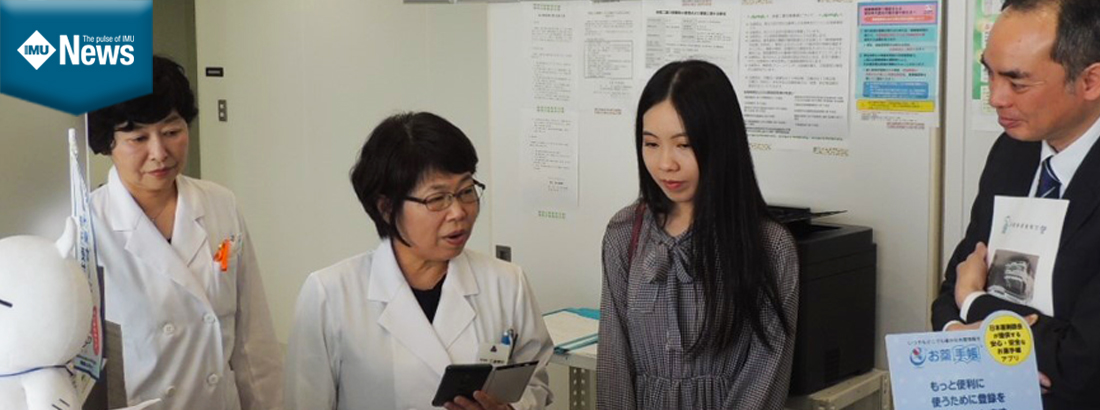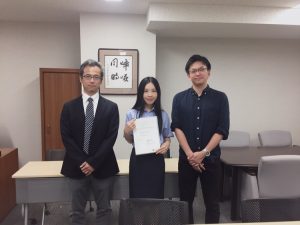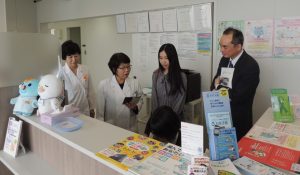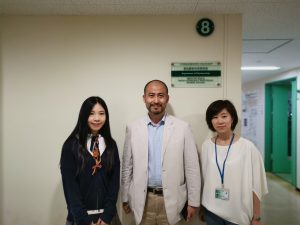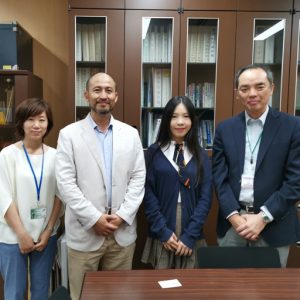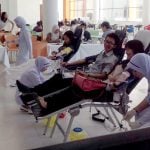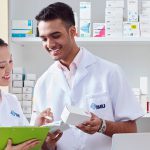In Semester 6 of the Bachelor of Pharmacy (BPharm) programme at International Medical University, students are offered an elective module where they are given the opportunity to explore their areas of interests with specified learning objectives. I decided to carry out my elective at Hiroshima University, Japan and spent four weeks at the University. The four weeks comprise of 2 weeks of hospital attachment and 2 weeks of research exposure.
During the first two weeks, I was assigned to the Department of Pharmaceutical Services at Hiroshima University Hospital under the supervision of Prof Hiroaki Matsuo. There are a total of 7 divisions under this department, including dispensing and compounding, therapeutic drug monitoring (TDM), drug information services (DI), medicine management (clinical pharmacists), clinical trial, department of infection control and general risk manager. I visited each department and listened to the introduction given by the pharmacists on duty who explained their daily job scopes.
I was intrigued by the technology and system applied in the compounding area. A digital system is implemented where physicians can upload prescription information into the software system. Upon receiving the prescription, the pharmacists will prepare the medicine with the help of the software system. They must scan the bar codes on the prescription sheets and labels from the drug bottles in order to make sure that the medicines tally with the prescription. This works as a double-checking system to prevent prescription errors. The weighing of powders and tablets are also assisted by the computer system, where an alert will go off if the quantity is incorrect. Vastly different from the Malaysian system, the healthcare system in Japan widely practices dispensing separation. It is a system where patients obtain prescription medications at a place different from where medical care is received. Doctors will issue a prescription to outpatients which will be brought to any community pharmacy or drugstore and the prescription will then be filled by pharmacists.
During my time there, I had the chance to visit a community pharmacy (Futabanosato Pharmacy) and a drugstore (Wants Drugstore). A community pharmacy focuses on prescription filling, where the premises is equipped with pharmaceutical refrigerators, automatic pill dispensers and other equipment required for compounding. On the other hand, drugstores apply a different concept of “health and beauty” where a variety of items including cosmetics, toiletries, and supplements are sold besides prescription medications.
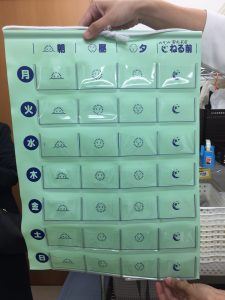 Currently, as Japan is facing the issue of an aging society, geriatric care is rapidly becoming an area of focus in their healthcare system. In order to tackle this problem, a unique system is introduced to support home care. I had the opportunity to follow a pharmacist to observe the profession’s contributions in this field. The pharmacist will visit an elderly patient’s home on a regular basis to arrange the medication into a pill organiser and follow up with the patient regarding medication use and side effects. Then, the pharmacist will report the patient’s condition to his or her physician in charge. This is an important task because the incidence of polypharmacy is rising with a profound risk of drug-drug interactions.
Currently, as Japan is facing the issue of an aging society, geriatric care is rapidly becoming an area of focus in their healthcare system. In order to tackle this problem, a unique system is introduced to support home care. I had the opportunity to follow a pharmacist to observe the profession’s contributions in this field. The pharmacist will visit an elderly patient’s home on a regular basis to arrange the medication into a pill organiser and follow up with the patient regarding medication use and side effects. Then, the pharmacist will report the patient’s condition to his or her physician in charge. This is an important task because the incidence of polypharmacy is rising with a profound risk of drug-drug interactions.
The following two weeks saw me attached to the pharmacology research laboratory led by Prof Norimitsu Morioka. The research carried out in this laboratory focuses on pain mechanisms which largely relies on animal studies, hence I had the chance to work in the animal facility. I learnt how to habitat a mouse before using it for experimental procedures and also tried to perform an intrathecal injection. Besides, I also learnt how to perform an immunohistochemistry study, which is the application of antibodies to selectively identify components in tissue samples. The entire process starts from the preparation of mouse brain samples, followed by blocking to minimize background signals, antibody labelling and analysis of images (visualization). I appreciated my first-hand experience in these experiments, as they have equipped me with the necessary skills and confidence to carry out my own research project in the future.
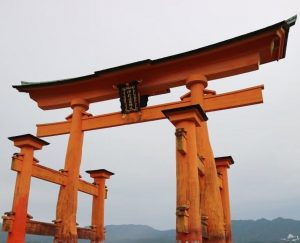
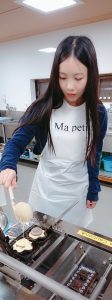 Japan is a country that has very distinct and different cultures and history from Malaysia. Hence, I took the opportunity to visit some of the famous spots in Hiroshima during the weekends with my new friends from the laboratory, such as the Atomic Bomb Dome. When the first atomic bomb in human history was dropped on Hiroshima, this building avoided complete destruction despite being underneath the explosion. Hence, it was kept intact until today as a reminder of the war and the importance of peace. I also visited Miyajima, which is an island well known for the floating O-Torii gate, placed in front of a shrine that symbolises the transition from the mundane to the sacred world. I also had the opportunity to try making momiji manjuu (maple leaf-shaped pancake), which is a famous dessert in Hiroshima.
Japan is a country that has very distinct and different cultures and history from Malaysia. Hence, I took the opportunity to visit some of the famous spots in Hiroshima during the weekends with my new friends from the laboratory, such as the Atomic Bomb Dome. When the first atomic bomb in human history was dropped on Hiroshima, this building avoided complete destruction despite being underneath the explosion. Hence, it was kept intact until today as a reminder of the war and the importance of peace. I also visited Miyajima, which is an island well known for the floating O-Torii gate, placed in front of a shrine that symbolises the transition from the mundane to the sacred world. I also had the opportunity to try making momiji manjuu (maple leaf-shaped pancake), which is a famous dessert in Hiroshima.
Moreover, my new friends also threw a welcome party for me, where we had a lot of enjoyable moments making takoyaki and sukiyaki together. I enjoyed the hospitality throughout my stay there. In summary, the one month in Japan has provided me with an in-depth experience of the healthcare system in Japan. At the same time, I had the chance to broaden my horizons, particularly regarding the unique Japanese culture and lifestyle as well as gaining valuable friendship from the trip.
| Acknowledgements |
|---|
| I would like to express my gratitude towards the Dean of School of Pharmacy, A/Prof Mohd Zulkefeli for the opportunity to carry out my elective in Hiroshima University and providing all the necessary information prior to my trip. A/Prof Mohd Zulkefeli also came and visited me at the university. My appreciation also goes to my mentor, Prof Er Hui Meng, my elective coordinator, Dr Gan Sook Yee and my parents for the advice and support in carrying out this elective. Finally, I would like to extend my sincere thanks to all the professors and students from Matsuo Laboratory and Morioka Laboratory at Hiroshima University for the guidance and company while I was in Japan. |
Written by Charmaine Caryn Teo Cher Ern (BP1/16)




